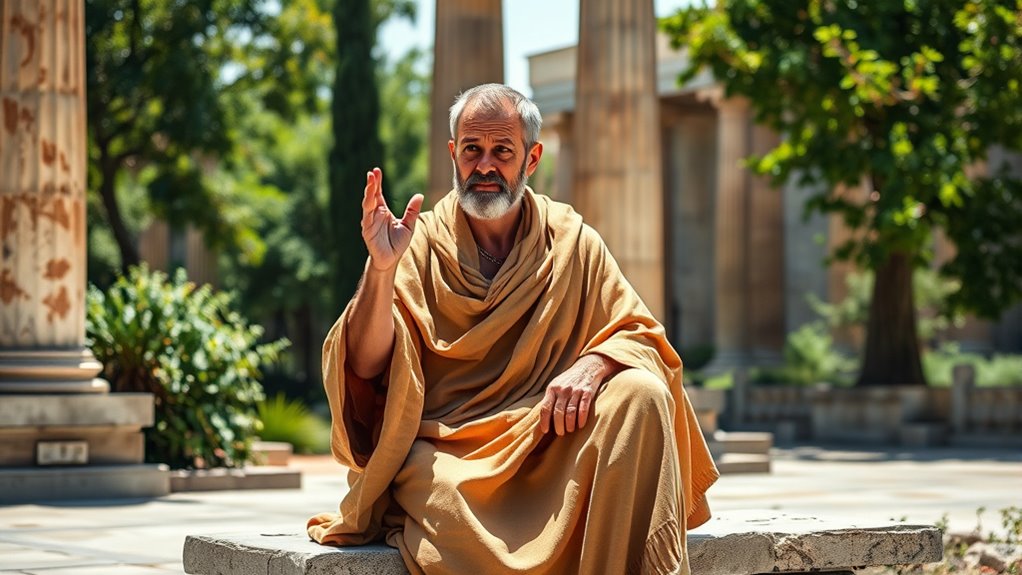Zeno of Citium, born around 334 BCE in Cyprus, founded Stoicism—a philosophy focused on virtue, self-control, and harmony with nature. You learn that he emphasized living morally, cultivating wisdom, courage, justice, and temperance to find inner peace. His ideas shaped a practical approach to resilience and ethical living, influencing countless thinkers and modern philosophies. If you explore further, you’ll discover how Zeno’s teachings continue to inspire personal growth and resilience today.
Key Takeaways
- Zeno of Citium, born around 334 BCE in Cyprus, founded the Stoic school of philosophy in Athens.
- He emphasized virtue, reason, and living in harmony with nature as the path to happiness.
- Zeno promoted self-control, resilience, and ethical living to navigate life’s challenges effectively.
- His teachings laid the foundation for Stoicism, influencing later thinkers like Seneca and Marcus Aurelius.
- Zeno’s philosophy continues to impact modern self-improvement, resilience practices, and mental well-being strategies.
The Early Life and Background of Zeno of Citium

Zeno of Citium was born around 334 BCE in the city of Citium on the island of Cyprus. Growing up, you’d find that his early life was shaped by the vibrant trade and diverse cultures of the Mediterranean. His family was likely of modest means, and little is known about his childhood. After a shipwreck, you’d learn that he traveled to Athens, where he became intrigued by philosophy. You might imagine him seeking answers to life’s big questions amid the bustling intellectual scene. His curiosity led him to study under various philosophers, including the Cynics and the Megarians. These experiences helped shape his worldview and laid the groundwork for his later development of Stoic philosophy. To create a harmonious and resilient mindset, Zeno emphasized the importance of personal virtue as the foundation of a good life.
The Foundations of Stoic Philosophy

You’ll see that virtue is the central goal in Stoic philosophy, guiding how you live and make decisions.
Self-control is essential, helping you stay steady amid life’s challenges.
Virtue as Central Goal
What makes virtue the central goal of Stoic philosophy? It’s because virtue embodies living in harmony with nature and reason. When you pursue virtue, you focus on developing qualities like wisdom, courage, justice, and temperance. These virtues guide your actions and choices, helping you stay resilient amid life’s challenges. Recognizing the importance of moral character, Stoics believe that cultivating virtue leads to a fulfilled life. Unlike material possessions or external success, virtue is within your control, making it the only true good. Stoics believe that by cultivating virtue, you achieve inner tranquility and moral integrity. Your happiness depends on your character, not external circumstances.
This emphasis on virtue as the ultimate goal underscores that living ethically and rationally leads to fulfillment, aligning your life with the natural order and achieving the highest good.
Emphasis on Self-Control
Self-control forms the foundation of Stoic philosophy, emphasizing the importance of mastering your desires and impulses to live a virtuous life. When you develop self-control, you can remain calm and rational regardless of external circumstances. This discipline helps you avoid emotional reactions that cloud judgment. To strengthen your self-control, focus on these key areas: 1. Recognize your impulses before acting on them. 2. Practice restraint in tempting situations. 3. Reflect regularly on your progress and setbacks. Incorporating mindful awareness of your environment can also support your efforts in space and organization, promoting clarity and focus in your daily routines. Additionally, understanding the effectiveness of glycolic acid products can enhance your skincare routine by encouraging consistent use of exfoliating treatments. Developing self-awareness about your emotional reactions further contributes to maintaining composure and making rational decisions. Being aware of beauty store hours can help you plan your shopping trips efficiently, reducing stress and impulsive decisions. Cultivating mindfulness techniques can also bolster your ability to stay present and control impulses in various situations.
Core Principles and Teachings of Zeno

You recognize that virtue is the highest goal in life, guiding your actions and choices. Living in accordance with nature means aligning your desires with reality and accepting what you can’t control. Self-control becomes essential, helping you maintain inner peace amid life’s challenges. Establishing a timeline for financial settlements can facilitate smoother resolutions and reduce stress during divorce proceedings. Understanding how to identify spoiled lemon juice can also remind us of the importance of discernment and moderation in all aspects of life. Additionally, cultivating an awareness of prophetic dreams can deepen your understanding of your subconscious messages and spiritual insights. Practicing self-awareness can further strengthen your ability to live in harmony with these principles. Considering the importance of tax implications can help optimize your financial strategies to support your overall well-being.
Virtue as the Goal
Zeno of Citium taught that virtue is the ultimate goal of human life, serving as the foundation for happiness and inner harmony. You should understand that virtue involves living wisely, courageously, and justly. He believed that by cultivating these qualities, you align your life with reason and moral excellence. To achieve this, focus on: 1. Developing wisdom to discern right from wrong. 2. Practicing courage to face challenges bravely. 3. Acting justly in your relationships and decisions. Additionally, understanding the importance of core principles like virtue helps in establishing a balanced and meaningful life.
Living in Accordance With Nature
Living in accordance with nature forms the foundation of Zeno’s philosophy, guiding how you should align your life with the natural order of the universe. You recognize that everything has a place and a purpose within this order, and your goal is to live harmoniously with it.
This means accepting what you can’t control and focusing on your own responses and virtues. By understanding that nature is rational and orderly, you see your role as part of a larger whole, not separate from it.
When you act according to nature, you pursue wisdom, moderation, and justice. Doing so helps you maintain inner peace and resilience, regardless of external circumstances, fostering a life rooted in harmony with the universe.
Emphasizing Self-Control
Central to Zeno’s teachings is the importance of self-control, which he saw as essential for living a virtuous life. You’re encouraged to master your desires and emotions, avoiding excess and impulsiveness. Zeno believed that self-control helps you maintain inner peace and resilience amid life’s challenges. To cultivate this virtue, focus on: 1. Recognizing your impulses before acting on them. 2. Practicing moderation in all aspects of life. 3. Developing mental discipline through daily reflection. Additionally, understanding the cultural narratives promoted through philosophy can deepen your appreciation of these principles and their relevance today. Emphasizing self-discipline as a foundational element of the philosophy can further strengthen your ability to embody these virtues. Recognizing the mind-body connection can also enhance your self-control efforts by fostering greater awareness of how emotions influence behavior. Incorporating emotional regulation techniques can support your journey toward greater self-mastery. Strengthening your mental resilience can help you stay committed to these practices even during difficult times.
The Development and Spread of Stoicism

How did Stoicism, founded in Athens, manage to spread across the Greek world and beyond? You’ll see that Zeno’s teachings resonated because they offered practical guidance for everyday life and emphasized virtue over material wealth. His ideas gained traction through the efforts of early followers who held public lectures and discussion groups. As these ideas spread, prominent thinkers like Cleanthes and Chrysippus expanded and refined Stoic philosophy, making it more systematic. The Roman world embraced Stoicism for its emphasis on self-control, resilience, and ethical living, appealing to leaders and common people alike. Key figures such as Seneca, Epictetus, and Marcus Aurelius adopted and adapted Stoic principles, ensuring the philosophy’s influence endured beyond Greece and into the Roman Empire, shaping Western thought for centuries. Additionally, the practice of creative problem-solving within Stoic teachings helped individuals confront challenges with resilience and resourcefulness, further solidifying its cultural influence and appeal across different cultures and eras. The dissemination of Stoic ideas was facilitated by the philosophical schools, which served as important centers of learning that preserved and transmitted its core concepts across generations. These centers played a crucial role in fostering a Cultural Intelligence that allowed Stoic ideas to adapt and thrive in diverse societal contexts.
Influence of Zeno’s Ideas on Later Philosophers

Zeno’s ideas laid a foundation that profoundly shaped the thinking of later philosophers. His emphasis on virtue, reason, and living in harmony with nature influenced many schools of thought. A key aspect of his philosophy was the importance of resilience in the face of adversity, which has been echoed in modern discussions of cybersecurity vulnerabilities. You can see this impact in three key areas:
- The development of Roman Stoics like Seneca and Marcus Aurelius, who adopted Zeno’s focus on self-control and resilience.
- The integration of ethical practices into daily life, inspiring later ethical philosophies across different cultures.
- The emphasis on rationality as a means to achieve tranquility, which influenced the rise of modern cognitive therapies.
Practical Applications of Zeno’s Philosophy Today

Today, Zeno’s teachings on virtue and self-control continue to influence practical approaches to well-being and personal development. You can apply his ideas by focusing on what’s within your control and accepting what you can’t change.
Practicing mindfulness helps you stay present and resist impulsive reactions, aligning with Zeno’s emphasis on self-mastery.
Stoic techniques like negative visualization prepare you for setbacks, reducing emotional turmoil.
Developing resilience becomes easier when you understand that external events don’t determine your happiness—your responses do.
By cultivating virtues such as wisdom, courage, and temperance, you build a strong character that guides you through challenges.
Zeno’s philosophy encourages a balanced life rooted in reason, helping you find tranquility amidst chaos and fostering lasting inner peace.
The Legacy and Enduring Impact of Zeno of Citium

Zeno of Citium’s teachings have left a profound mark on philosophical thought and personal practice that extends far beyond his lifetime. His ideas form the foundation of Stoicism, influencing countless thinkers and modern approaches to resilience and virtue.
Your understanding of self-control, rationality, and acceptance stems from his principles. The enduring impact includes:
- The development of Stoic ethics, emphasizing virtue as the highest good.
- The influence on later philosophies, like Roman Stoicism and Renaissance humanism.
- The integration of Stoic practices into modern self-improvement and mental health strategies.
Frequently Asked Questions
How Did Zeno’S Personal Experiences Shape His Philosophical Ideas?
Your personal experiences deeply influence your philosophical ideas, shaping your views on how to live a good life.
When faced with adversity or hardship, you learn resilience and develop a desire for inner peace. These challenges teach you the importance of self-control, virtue, and accepting things beyond your control.
Your struggles push you to seek wisdom, helping you create a practical philosophy that guides your actions and attitudes daily.
What Were the Major Criticisms of Zeno’S Stoicism During His Lifetime?
You might find that during Zeno’s lifetime, critics argued that his Stoic ideas were too rigid and dismissive of emotions. Some believed his emphasis on virtue and self-control ignored human complexity and passions.
Others thought his focus on accepting fate could lead to passivity or complacency. These criticisms challenged the practicality of his philosophy, prompting debates about whether Stoicism offered a balanced way to navigate life’s difficulties.
How Did Zeno’S Teachings Differ From Those of His Contemporaries?
Did you know that only about 8% of ancient philosophies focused on personal virtue instead of external factors? You’ll notice that Zeno’s teachings emphasize inner virtue and self-control, setting them apart from many of his contemporaries who prioritized external achievements or divine intervention.
Unlike the Epicureans or Skeptics, Zeno urges you to find tranquility through rationality and discipline, making his philosophy uniquely centered on personal responsibility and resilience.
Are There Any Surviving Writings Directly Authored by Zeno Himself?
You might wonder if Zeno’s writings have survived directly. Unfortunately, no original texts authored by Zeno are available today. Most of what we understand comes from later philosophers and students who recorded his ideas.
You won’t find any writings penned by Zeno himself, but his teachings live on through these secondary sources, helping you understand his influence on Stoicism and ancient philosophy.
How Has Zeno’S Philosophy Influenced Modern Psychological Practices?
Your journey into modern psychology reveals a treasure chest of ancient wisdom guiding you through life’s storms. Zeno’s philosophy emphasizes emotional resilience and control, core ideas in cognitive-behavioral therapy (CBT).
Conclusion
You can see how Zeno’s ideas are like a sturdy tree, whose roots run deep through centuries of thought. His teachings on virtue, resilience, and inner peace continue to inspire, helping you navigate life’s storms with calm and clarity. By embracing his philosophy, you’re planting seeds of wisdom that grow stronger with time. Zeno’s legacy remains a guiding light, shining brightly like a lighthouse guiding ships safely through dark waters.









